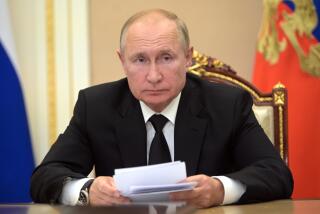Opening Up : Makers of Medical Products See Sales Opportunities in Eastern Europe
- Share via
IRVINE — When Hevka Sramek was born in Czechoslovakia in 1936, that country’s health care system was one of the best in Europe. Then came World War II and more than four decades of Communist control.
Sramek took political refuge in the United States in 1964. She returned to her homeland for a visit in 1988. In those 24 years, Sramek said, the medical system had deteriorated badly.
“Everything was ready to collapse,” she said, recalling her visit.
But Sramek, a founder of BoMed Medical Manufacturing, saw opportunity. She figured she could help her homeland while fostering new business for BoMed, an Irvine-based company that makes equipment to evaluate heart performance.
BoMed is one of a growing number of medical product firms in the United States that are beginning or intensifying business relationships with Eastern Europe. They are attempting to cash in on Eastern Bloc countries’ interest in developing their economies and diverting spending from the military to social programs such as public health.
But U.S. firms seeking entry into Eastern Europe find it is rife with obstacles generally associated with Third World countries, from shortages of hard currency to bureaucratic delays. There is a strong demand for knowledge and training after decades of technological isolation. Each country has its own idiosyncrasies, and each is at a different point in the economic transition.
BoMed found that in Czechoslovakia, there was a severe shortage of money to buy medical equipment. The company circumvented that problem by establishing leasing offices in Prague and Martin. Doctors and hospitals in those two cities, then, can rent BoMed products rather than buy them.
Some U.S. firms are using marketing techniques that combine humanitarianism with commercialism in the hope that the investment of time and money will pay off in business months or years down the line. They are, for instance, donating sophisticated equipment lacking in Eastern European hospitals or paying for American physicians to travel to lecture in Eastern Europe or bringing Eastern European physicians to the United States to attend symposiums and visit hospitals and plants where medical products are manufactured.
“You need to be creative in marketing to Eastern Europe,” said Walter Batt, manager of Eastern Europe for Baxter International, which has several divisions in Orange County. “If we treat them like we do any other market, we won’t be successful.”
Batt said Baxter is donating more of its surplus products to Eastern Europe in recognition of the great need there and the fact that there is a shortage of currency in countries struggling to change economies that had been relying heavily on barter.
Baxter’s Irvine-based Bentley division several weeks ago sent $250,000 worth of disposable supplies used in cardiac surgery to a hospital in Poland when Baxter learned that the hospital had a critical need. Bentley is also sending supplies to two new East German heart centers scheduled to open later this year and is donating supplies and money to help establish an open-heart surgery center for children in Romania.
“We’re interested in building good will from providing them with Bentley products and hopefully that will help them think positively of us in the future,” Bentley President Michael Mussalem said of his company’s efforts.
He noted that only 2% of Bentley’s international business is now in Eastern Europe.
Orange County medical company executives say that since the move toward economic decentralization of Eastern European countries began about a year and a half ago, most sales now are not negotiated with government trade offices but instead with local doctors, hospitals and others who will actually use the equipment.
In recognition of the potential offered by a unified Germany, some companies are hoping to exploit relationships they have forged with West German physicians moving into the East Germany health care market.
Catherine Zobel, president of Baxter’s Irvine-based Edwards division, which makes catheters, said in June that a company executive had joined a West German physician on a visit to a hospital in East Germany to help determine what equipment the hospital needs to buy. She noted that facilities chosen for upgrading in East Germany include 18 open heart surgery centers that might be candidates for Edwards products. The June trip, she said, resulted in Edwards’ first sale to East Germany of catheters used to open clogged arteries in the heart.
Edwards is one of the U.S. companies paying for foreign physicians to visit this country. “We are sponsoring travel opportunities for surgeons to come to the United States and observe surgery and work with cardiac surgeons,” said Ann Whitehair, director of marketing for Edwards’ cardiovascular unit, which makes artificial heart valves.
Whitehair said the company recently sponsored a group of physicians from Poland who spent a week at a hospital in Portland, Ore., learning surgical techniques. When they returned home, she said, they placed orders for heart valves.
Whitehair said that although less than 20% of her division’s international business is in Eastern Europe, “there is definitely growth potential.”
Last week, a delegation of 11 physicians and local government health representatives from Siberia and the eastern coast of Russia visited the Beckman Instruments manufacturing plants in Fullerton and Brea. The trip was sponsored by Beckman, a leading maker of medical research and diagnostic instruments, and by Cameron & Associates, an international trading company based in Sacramento.
It was the third Soviet delegation trip Beckman has sponsored this year; one of those trips resulted in a $500,000 sale of diagnostic equipment.
Beckman has been selling products in the Soviet Union for 25 years, but most of its deals were negotiated with the central government. With perestroika, the company is now developing long-term relationships with regional physician groups and local government officials.
Dr. A. I. Vialkov, a representative of the Department of Health in Khabarovsk, acknowledged that his visit to Beckman last week would have been “problematic” before the Soviet Union moved to decentralize its economy and open relationships with the United States.
“Now they have stopped managing us from the top and we can actually solve our own problems that we know best,” Vialkov said.
Vialkov said he was seeking not only medical products from the United States but also advice on how to establish a system of health care delivery in eastern Russia so that the equipment will have the broadest possible effect in public health.
To see how health care is delivered in California, the delegation also met with officials of the California Department of Health Services and of UC Davis, and with the Orange County and Los Angeles medical associations.
Vialkov acknowledged that medical care has not been a high priority for the Soviet government, but, he said, that is gradually changing.
Although the Soviet Union is spending only 3% of its gross national product on medicine this year, he said, that is a higher percentage than was spent last year. He added that the Russian Republic, which represents 190 million of the 280 million Soviet citizens, has agreed to double its health care budget for next year by cutting military spending.
Beckman in particular stands to gain from a Soviet plan to develop more than 300 new diagnostic clinics throughout the country. Michael Whelan, Beckman’s director of Northern Europe, said that so far, Beckman has provided equipment to completely outfit 40 of those clinics and is hoping to land still more of the business to be had.
Meanwhile, though, Beckman is taking advantage of an opportunity to increase its presence in the Soviet Union. After a 10-year struggle, the company two years ago got permission from Soviet authorities to open a tiny office in Moscow. A year ago, Beckman opened a more spacious office and a training facility in Moscow, where it is now entering a joint venture with a government agency to build a large service support center.
More to Read
Inside the business of entertainment
The Wide Shot brings you news, analysis and insights on everything from streaming wars to production — and what it all means for the future.
You may occasionally receive promotional content from the Los Angeles Times.










